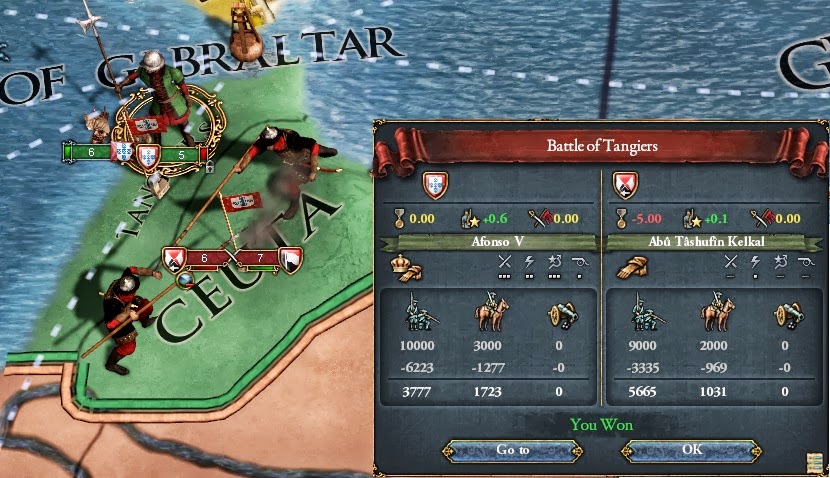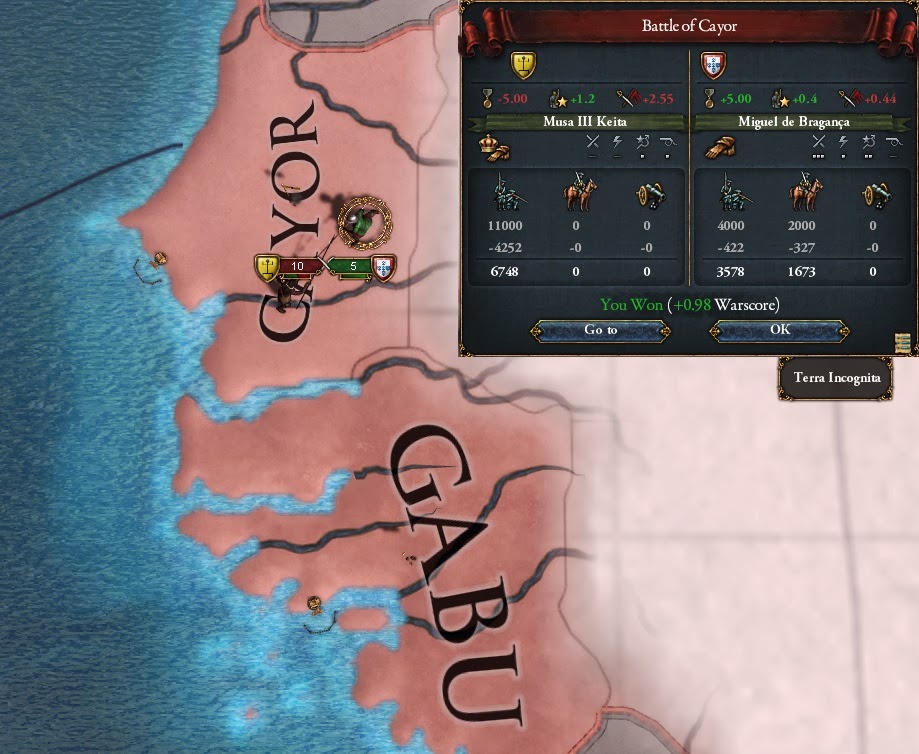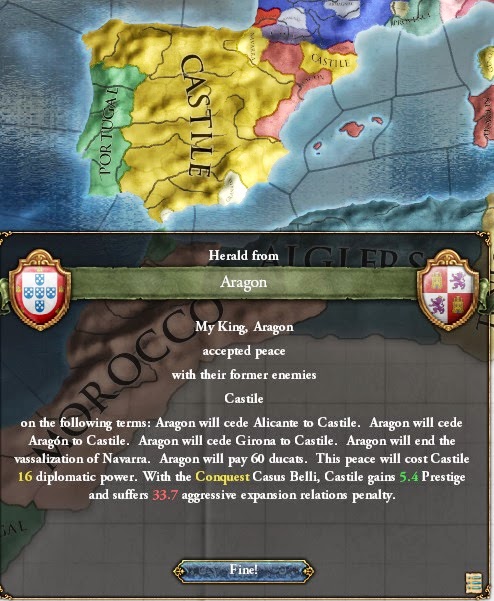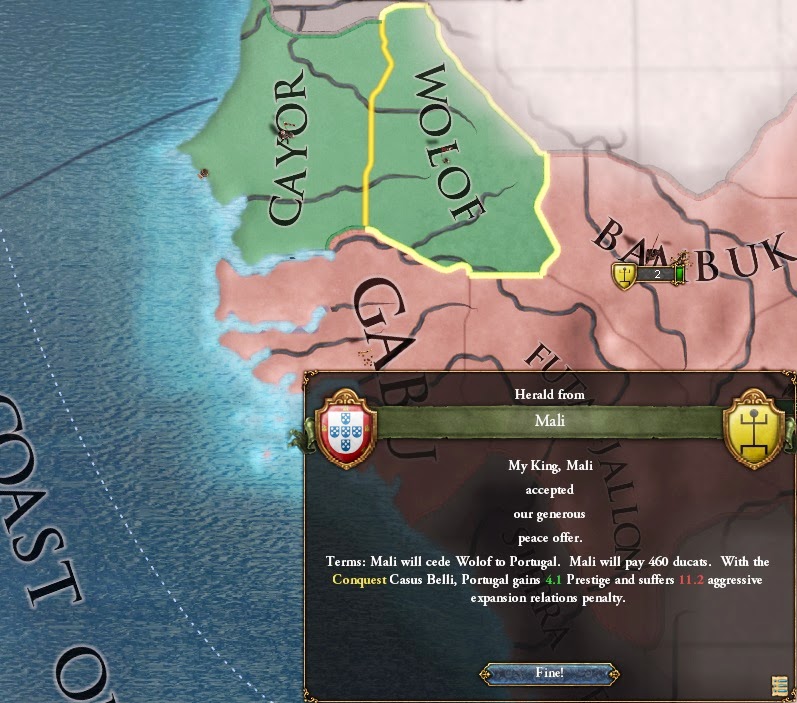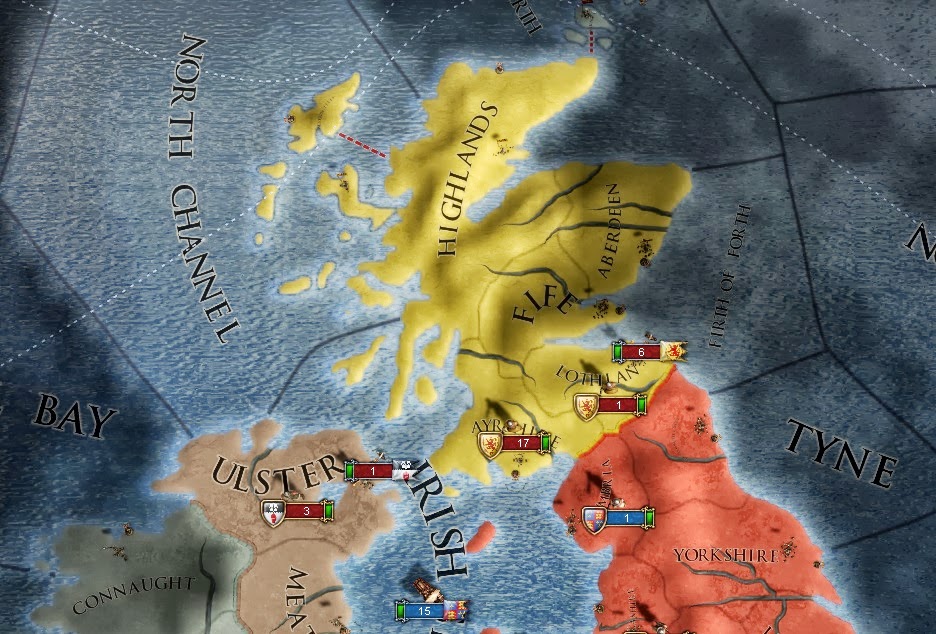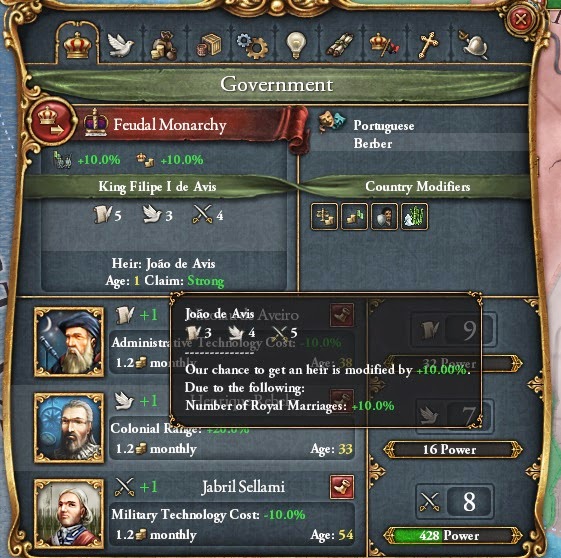Death of Alfonso V
African Expansion
After conquering Mali, Portuguese forces marched to Sierra Leone, a province right next to Mali and pacified the province. After several battles with the natives, the province was deemed safe for colonization. In August 1463, first colonists settled there and soon, news of fertile lands where life is easy spread and colonists begun to arrive. Also, at the same time, Cayor and Wolof became cores of the and Portugal finally unlocked Quest of the New World. With that, new explorers and conquistadors were.
Meanwhile in Europe, both Castile and England went to war. Castile went for deliver another blow against Aragon while England went to war with Scotland, with a quest to vassalize them. Portugal once again agreed, but for England, they did nothing. For Castile, Armada Real sailed once again to the Mediterranean.
Henrique Rebelo
In October 1465, Henrique Rebelo was called to Lisboa by Alfonso. Before that, he was governor of Cape Verde, Portuguese first successful colony in Africa. That position gave him quite a bit of knowledge how the process works- how work with supply ships, how to build, how do defend and most importantly- how to survive. He was employed as one of the closest advisors to King Alfonso and thanks to his ideas, some changes were made.
Arrival of Henrique
Sierra Leone was left on their own, with no official state support. That meant that the colony keeps on growing, but in much lesser extent. Instead, the Portuguese founded next colony in Gold Coast. The colony was found in the beginning of 1466 and soon, 12 000 Portuguese soldiers were in the province. In May 1466, the battle broke out between Portuguese forces and locals and as a result, 8000 natives lost their lives while Portuguese losses were miniscule. With that, the colony was safe.
Foundation of colony in Gold Coast and the defeat of locals
Gold Coast was in perfect position for trade routes. It now meant that trade from around Gulf of Guinea started slowly to flow to Mauretania and from there, to Sevilla. Just a trickle in the beginning, but with good prospects to turn into stream. Furthermore, it will help to steer trade from both Brazil and Southern Africa to Portuguese homelands, so controlling Ivory Coast trade node is vital for Portugal.
Back to Europe
Meanwhile, England was not doing very good against their war with Scotland. Quite contrary, English got their buttocks whopped in Scotland. Enough that even Navarra decided to declare war on England- in June 1467, they attacked England, claiming the province of Labourd. Burgundy followed in January 1648, claiming Caux. Also, England had lost their possessions in Ireland some time ago. It was not a good time to be English.
English situation near the borders of Scotlands is all but promising...
Spanish were doing much better, overrunning Aragonese lands. In yet another battle in Gulf of Mallorca, Portuguese heavy ships attacked Aragonese fleet of 8 galleys, 1 barque and 4 cogs. In July 1467, the battle had once again turned into Portuguese favor. Puny Aragonese galleys were no match to large Portuguese floating fortresses, armed with more cannons then an army usually brings with them and good, strong hulls. Devastated by cannonfire, Aragonese once again fled, leaving Portuguese as masters of the sea.
Portuguese only battle in Castilian-Aragonese war
Also in 1468, Portuguese made several advancements. Better production, better colonial range and even more better production. With the advancements, Portugal now had quite proper range. Nothing can now stop the Portuguese expansion...
Improvements! More is always better!
Death of the King
In May 1468, Portugal once again declared war on Mali. Target was the treasury and the province of Gabu (yes, in that order). Portuguese begun once again to advance to now already quite well mapped Malinese lands. It was going on as usual, with not much resistance from Mali.
Then, in December 1468, King Alfonso V died after weeks of illness. He passed away in Lisoba, surrounded by his relatives. Alfonso was a great King, pushing Portugal further south, towards new lands, undiscovered before. During his time, Alfonso had several white spots from the maps removed- he had ordered mapping of African coast, a strange new lands now called Brazil and Caribbean islands. He took Tangiers from Morocco, he attacked Mali several times and he started the colonization of Africa. During his time, provinces of Tangiers, Cape Verde, Rio de Oro, Cayor, Wolof, Sierra Leone and Gold Coast were gained.
Filipe I took the throne. He was a bit better monarch then Alfonso and his son, Joào, was even better. The future of Avis line was secured.
King Alfonso V is dead, long live King Filipe I




